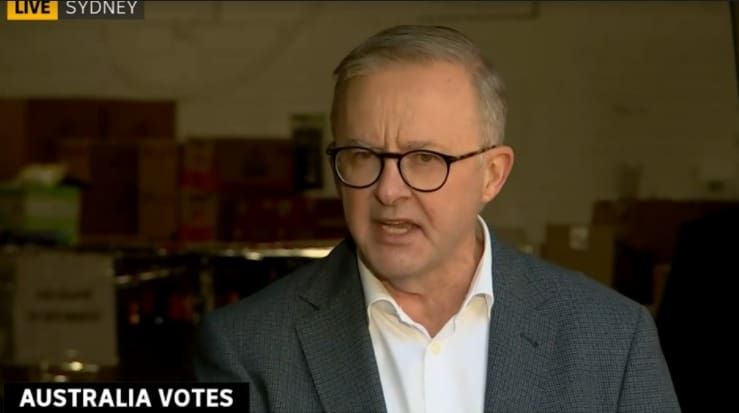
ALEC CEO Mark Harvey-Sutton dockside: concerned about whistleblower payments.
CONFIRMED payments to a live sheep export whistleblower have raised the prospect of a new investigation and doubts about subsequent animal activist-generated footage.
And federal Labor’s vacillation on its live sheep export policy during the federal election has raised the ire of the nation’s peak exporters’ body.
The Australian newspaper yesterday reported that a leaked statutory declaration by Animals Australia strategy director Lyn White discloses details of $US107,710 ($148,000) in various payments made to AA’s star whistleblower Fazal Ullah and his family.
The disclosure has prompted Nationals Senator Matt Canavan to call for a new investigation into the payments, despite Agriculture Minister David Littleproud claiming an investigation by his department found no evidence that any payments to ship workers had been made.
Australian Livestock Exports Council chief executive officer Mark Harvey-Sutton said the more concerning thing about the whistleblower payments is that they create a market for animal cruelty.
“If you have incentives for footage of animal cruelty footage, you are creating a market for poor animal outcomes.”
Mr Harvey-Sutton said he was not suggesting that sheep were placed in a less than optimum animal welfare situation to create the footage supplied by Fazal Ullah.
“But that is, in my view a very serious potential consequence of this practice.”
Mr Harvey-Sutton said he could not comment on whether the confirmed payments undermined the credibility of the whistleblower’s evidence and the validity of the subsequent regulatory constraints put on the industry.
“I think, taking that (The Australian) story on face value, and assuming that the payments were made, that questions do need to be asked about the strength of the evidence.
“The one thing we can’t deny that those animals on the Awassi suffered terribly, so in no way am I denying the issue there,” he said.
“But the broader practice that I am concerned about is this practice of activist groups paying people for footage if the potential consequence is that that footage becomes incentivised and therefore poor practices are encouraged.”
Leaked declaration is part of an intimidation strategy – Animals Australia
Animals Australia’s CEO Glenys Oogjes said the unlawful leaking of a court document — the White statutory declaration — to the media, is yet another example of an ongoing strategy to intimidate and undermine a whistleblower and key witness in a major animal cruelty prosecution.
“That Mr Ullah courageously chose to be loyal to his conscience and not the live export industry has placed him and his family at great risk, as well as ended his shipboard career.
“Without his bravery, live export companies would have continued to ship millions of sheep during the Middle East summer months despite knowing the dire consequences that sheep would face – heat stress for all and death for countless thousands,” she said.
“This latest attempt to deflect industry’s responsibility for egregious cruelty, presents a clear example as to why whistleblowers and prosecution witnesses in this country need to be afforded the highest levels of support and protection.
“The facts are that 2.5 million sheep have unnecessarily suffered and died on Australian live export ships,” Ms Oogjes said.
“One man had the courage and compassion to show the Australian public what sheep have endured over many decades.
“Similarly, had it not been for the investigations of Animals Australia over many years, livestock producers and the general community would still be in the dark about the horrors being inflicted on their animals in overseas markets and abattoirs,” she said.
“Fifty years ago, exporting animals by ship to countries devoid of animal cruelty laws may have been deemed acceptable.
“But now, thanks to a collective heightened understanding and appreciation of animal sentience, our societal responsibility for animals raised in human care has evolved and expanded,” she said.
Ms Oogjes said Mr Ullah’s extensive evidence – filmed at great risk to himself – has provided an unprecedented window for the regulator, producers and the public to witness the reality of this suffering.
“Animals Australia has consistently advocated our support for farmers to be assisted to move from live sheep export.
“We will continue to do so.”
She said Animals Australia will also continue to prioritise protecting “this brave young whistleblower.”
“The decades-long acceptance of shocking cruelty and suffering by sheep export companies should ignite serious questions about their integrity, not the integrity of those who courageously sought to bring this suffering to light.”
Regulation of trade still valid – Alliance for Animals
Alliance for Animals director Dr Jed Goodfellow said the validity of the regulations imposed on the live sheep trade following the release of footage from the Awassi Express in 2018 is beyond question and has been independently confirmed by successive government reviews.
“The McCarthy Review, the Heat Stress Risk Assessment Review, and the Review of the Australian Standards for the Export of Livestock have all confirmed that exporting sheep to the Middle East during the Northern Summer months from May to October, inclusive, will result in sheep suffering severe heat stress consistent with that depicted in footage from the Awassi Express.
“Millions of Australian sheep have perished onboard live export vessels during this period over the trade’s history,” he said.
“Indeed, the year prior to the Awassi Express disaster, over 3000 sheep perished on board the Al Messilah after departing Fremantle for the Middle East in July 2016.
“Sheep exporters and the Department of Agriculture have long been aware of these risks and should have introduced regulations prohibiting the trade during the Northern Summer decades ago,” he said.
No breach of Commonwealth law over alleged payments
A Department of Agriculture Water and the Environment spokesperson said in January 2019, the department commenced an investigation into allegations reported in the media that live export workers had been offered money to obtain and leak footage of animal cruelty on export vessels.
“The department sought information from a wide range of sources in relation to these allegations, some of whom cooperated and others who chose not to.
“The department found no evidence to suggest that breaches of Commonwealth laws had been committed in relation to alleged payments,” the spokesperson said.
Click here to read the department’s previous 26 July 2019 statement on its investigation.
No Labor backflip on live sheep trade phase-out

Opposition leader Anthony Albanese in Sydney today – no live sheep trade phase-out timeline.
In other live export news today, when asked if the ALP would commit to timeline for ending live sheep exports, Opposition leader Anthony Albanese in Sydney said: “No, we won’t, and we haven’t in our policy.
“Our policy’s changed,” he said.
“The amount of live exports has halved in recent times and we will continue the summer ban, but we’ll consult with state governments, in particular the West Australian state government, but we will also consult with the agricultural sector about the issues around live sheep export.”
Some media outlets have interpreted this as a ‘backflip’ from the ALP’s 2019 policy to phase out live sheep exports; however, Mr Harvey-Sutton said he has had it confirmed by Opposition leader Anthony Albanese’s office that there has been no backflip.
“Albanese’s office has confirmed that the policy (to phase out the trade) still remains … the phase-out policy without the timeframe on the phase-out, so that’s the bit that has changed.
“It’s fair to say this lack of clarity is not fair on the industry nor it is fair on farmers, because essentially they are flip-flopping on people’s livelihoods,” he said.
“We think the (phase-out) policy itself is unnecessary because of the industry performance, particularly since the last election; it’s been nothing short of outstanding and ship exporters have had the best results they’ve ever had.
“And it also sets a very concerning precedent that an industry can do everything that’s asked of them and exceed those expectations with best-performance-ever, yet they can still be shut down as political fodder,” he said.
“That’s very concerning to the whole sector.”
Mr Harvey-Sutton said he could not speculate on whether Labor’s posturing on its live sheep export policy was due to its desire to improves its standing ion key Western Australian rural seats.
“I’m not going to speculate on what their election strategy is.
“I think they key thing that I’m more focussed on is allowing what is a legitimate industry — that has performed extremely well and is of great importance to the farmers and also our geopolitical trading partners – to continue,” he said.
Sheep Producers Australia CEO Bonnie Skinner said the peak body and its state-farming organisation members share a commitment with ALEC and its exporter members to high animal welfare standards that underpin Australia’s reputation as a trusted supplier of high-quality livestock.
““Allegations into any “cash for cruelty” is of grave concern and any activity to jeopardise animal welfare, our reputation and our trading markets requires thorough investigations and severe penalties across all our respective areas of the supply chain if allegations are proven,” she said.
Sheep Central is waiting for responses to questions put to Mr Littleproud, the ALP, Senator Canavan and WA Premier Mark McGowan.

So Mark Harvey-Sutton thinks the live sheep trade phase-out is “unnecessary because of the industry performance, particularly since the last election; it’s been nothing short of outstanding and ship exporters have had the best results they’ve ever had.”
Really. We wouldn’t know what’s been going on on ships in the last two years beyond the reported mortality rate, because there haven’t been any independent observers (IOs) aboard from June 2020 to May 2022 – that’s hundreds of voyages.
But when there were IOs aboard, they reported ASEL breaches on 75 percent of voyages that had sheep aboard. The breaches including poor quality feed (including mouldy feed in the troughs), withholding feed and water, ewes lambing on board (shouldn’t have been loaded), insufficient space/overcrowding, insufficient bedding, and incomplete, incompetent, unnecessary or completely lacking euthanisation. Sheep were euthanised due to infected dog bite wounds (shouldn’t have been loaded) and some died from shearing cut wounds (shouldn’t have been loaded).
Let me just repeat that all this happened while people paid by the government were watching, recording and taking notes. What on earth have the animals suffered through while no one has been watching these past two years?
The industry is in decline; it’s a dying industry; down 92pc since 2001. It has declined 25pc each year between 2017 to 2021, with a total decline of 70pc in those five years from 1.9 million to just 575 thousand. Now is the time to put the tiny trade out of its misery and become the smart country again.